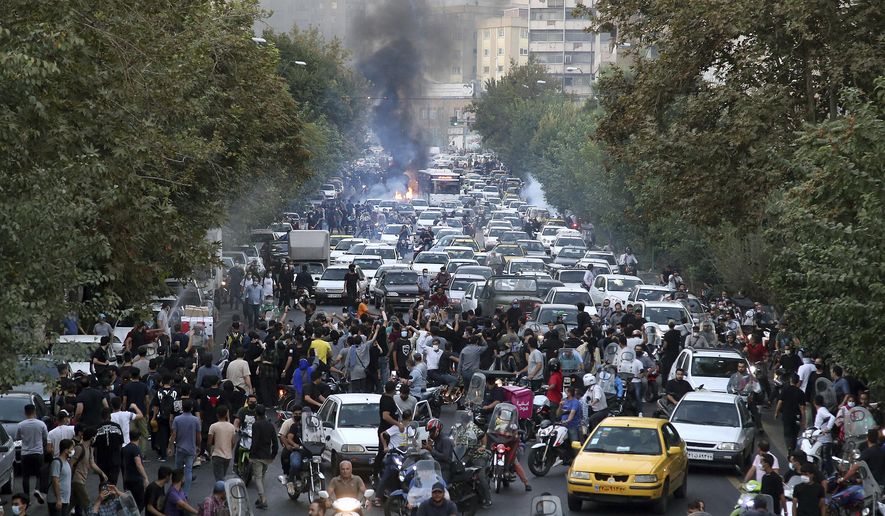Fierce nationwide protests that have gripped Iran for the past month mark an inflection point for the country, said the leaders of a powerful exile Iranian dissident group on Wednesday. They urged the United Nations and governments across the globe to immediately expel all Iranian diplomats and escalate pressure on the theocratic regime in Tehran.
At a press conference Wednesday, officials with the National Council of Resistance of Iran (NCRI) — an umbrella group for Iranian dissidents who oppose the hard-line Iranian government — detailed what they said was the brutality committed by Iranian security forces since widespread demonstrations broke out 34 days ago. The protests were sparked by Masha Amini’s death last month while in custody of the country’s “morality police,” allegedly for wearing her hijab too loosely.
Since the protests began, security forces have killed 400 Iranians while they’ve arrested another 20,000 people, according to the NCRI’s own tallies. But the violent crackdown seems to have done little to quell the uprising, which has spread to 194 cities across all of Iran’s 31 provinces, making them the largest mass demonstrations since 2017.
“No matter what the regime does, and despite all the ups and downs, the regime can never return to the status quo or the situation before September 2022,” said Soona Samsami, NCRI’s U.S. representative.
With pressure growing on the regime at home, Ms. Samsami said the international community has a golden opportunity to work toward the current government’s downfall.
“All the embassies of the Iranian regime must be shut down and all the diplomats of the Iranian regime have to be expelled,” she said. The “Iranian regime should be expelled from all international bodies and all economic ties must be severed.”
Protesters’ anger appears to be targeted largely at Iranian President Ebrahim Raisi and Iranian Supreme Leader Ayatollah Ali Khamenei. NCRI officials said that young protesters in Iran have specifically focused on posters, statues and other items bearing the likeness of the supreme leader, suggesting a growing movement across the country for a move away from the hard-line religious theocracy that has ruled Iran for more than 40 years.
For Iran, the demonstrations come against the backdrop of mounting anger in the West over Tehran’s military backing for Russia’s invasion of Ukraine. Russia’s military stockpiles have dwindled after nearly eight months of war, but Ukraine and its Western allies say Iran has helped replenish them with multiple shipments of missiles, drones and other weapons.
But just this week, Tehran reportedly agreed to send more weapons to Russia, including short-range Zolfaghar ballistic missiles and Shahed-136 drones. The latter has been one of Moscow’s weapons of choice in its brutal recent rocket-and-drone campaign in Ukraine, which has targeted Ukrainian energy infrastructure in a bid to freeze out its enemy over a long, cold winter.
The shipments highlight the growing partnership between Russia and Iran, but they also could deepen Tehran’s isolation. Ukrainian Foreign Minister Dmytro Kuleba on Tuesday reportedly submitted a proposal to sever Ukraine’s diplomatic ties with Iran, blaming the country for contributing directly to the bloodshed.
“Tehran bears full responsibility for the destruction of relations with Ukraine,” Mr. Kuleba said Tuesday, according to Reuters.
The European Union also is weighing fresh economic sanctions against Iran over the arms shipments. Iranian officials have denied taking sides in the conflict and have said it is not their concern how Russia uses its weapons after they’re delivered.
The U.S., meanwhile, has essentially shelved its effort to revive an Obama-era nuclear deal with Tehran. Then-President Trump in 2018 pulled the U.S. out of that agreement, which offered Iran economic sanctions relief in exchange for limits on its nuclear program. The Biden administration has tried for nearly two years to resurrect the pact or strike a new one to take its place, but despite signs of progress earlier this year, officials now say the talks have stalled.
“It’s not even on the agenda. It’s not a focus because there’s no movement,” Robert Malley, the State Department’s special Iran envoy, told CNN earlier this week. “We do believe that we need to stop this regime from acquiring a nuclear weapon. Diplomacy is a way to do that and we will see whether this is a government that is interested in reaching that deal. But at this point, the focus is on what’s happening in Iran, because the talks are stalled.”
Correction: A previous version of this article misidentified the Iranian president.
• Ben Wolfgang can be reached at bwolfgang@washingtontimes.com.




Please read our comment policy before commenting.